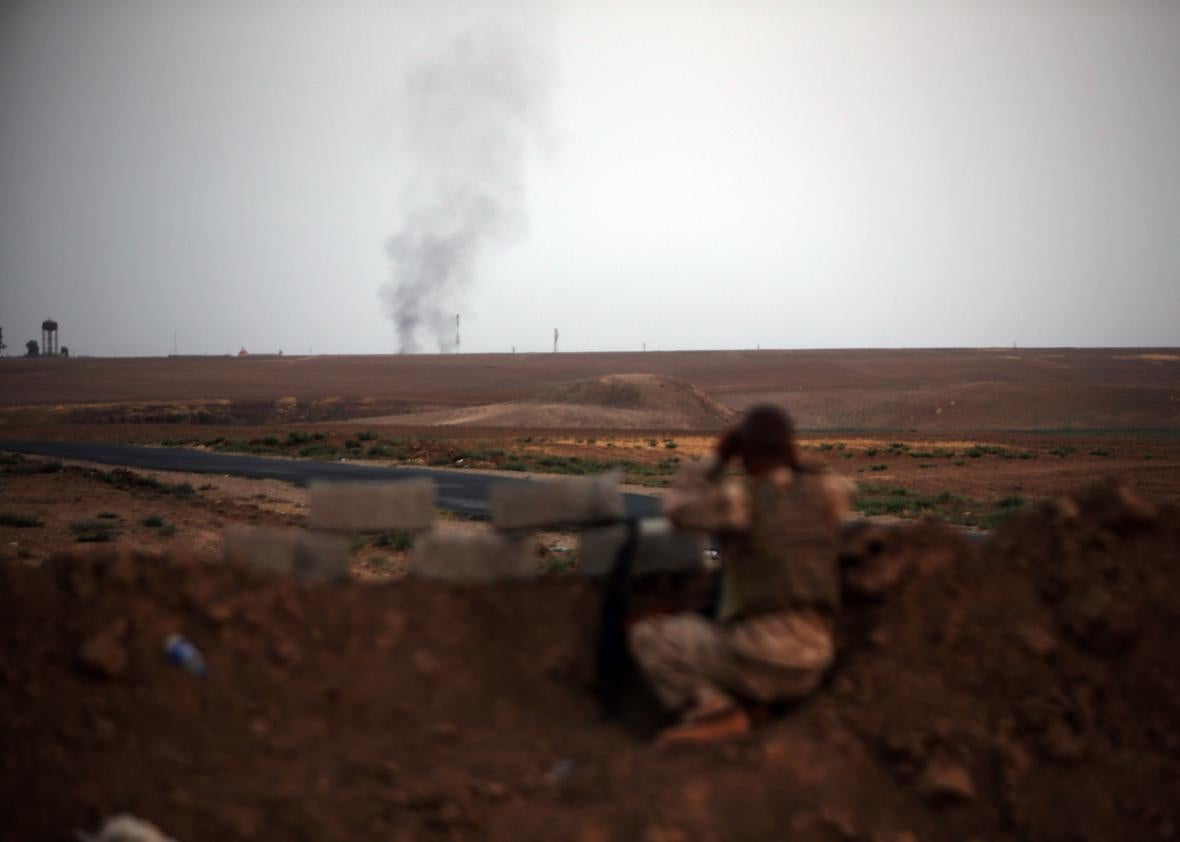For a long time, it ‘s been fairly apparent that Donald Trump’s stated reluctance to publicly discuss his military strategy for defeating ISIS, so as not to tip off ISIS, is just cover for the fact that he doesn’t actually have a military strategy for defeating ISIS. But as with many of Trump’s on-the-stump ad libs (Mexico will pay for the wall, national stop and frisk, etc.) he’s quadrupled down on the idea, making it a central theme of his campaign and his attack on the Obama administration and Hillary Clinton.
During last week’s debate, Trump criticized Clinton for putting her plan to fight ISIS on her website, saying, “You’re telling the enemy everything you want to do!” and “I don’t think Gen. Douglas MacArthur would like that too much.” (Burn.)
On Sunday, he had this to say about the impending battle to retake Mosul:
Then on Monday, during a speech to a veteran’s group that made headlines for other reasons, Trump followed up, saying:
It was very disconcerting when I saw that an attack is planned on Mosul, an attack is planned. … Why do we have to talk about it? Why? I never saw anything like this. Every time we are going to attack somebody, we explain. We’re going to attack, we’ll be attacking at three, noon on March 25. I don’t know, unless you disagree with me, wouldn’t it be better if we were going to go after Mosul to not say anything and do it, as opposed to announcing—they’re announcing all over television they’re planning to attack Mosul.
Much as I hate to admit it, there’s a small kernel of truth in this. In February 2015, for inexplicable reasons, the U.S. Central Command gave a briefing to reporters announcing that an offensive to retake Mosul would begin in April or May involving 20,000 to 25,000 Iraqi and Kurdish troops. The announcement was seemingly aimed at reassuring the American public the ISIS situation was under control: There was no tactical reason to get so specific about the timetable. Worst of all, the timetable came as a surprise to those who were actually supposed to be doing the fighting. (The timetable proved to be way too ambitious for Iraq’s disorganized military forces and was eventually abandoned, in favor of efforts to retake smaller cities.)
But that mismanaged episode is, of course, not really what Trump is talking about. Let’s take Clinton’s website first. The section on HillaryClinton.com that deals with fighting ISIS promises to step up the air campaign, support allied Arab and Kurdish forces on the ground, and work for diplomatic solutions to resolve the conflicts in Syria and Iraq. That’s it. This is of no more strategic value to the evildoers in Raqqa than when Trump suggested making Turkey “do much more against ISIS,” as if he was the first person who had thought of that. Yet Trump seems to think this boilerplate, bipartisan conventional wisdom is like a Bond villain telling 007 the details of his evil plan before dropping him in a shark tank.
As for the impending battle of Mosul, I’m not sure exactly what announcement Trump is talking about. Perhaps the news last week that the U.S. is deploying 600 additional troops to Iraq to assist in retaking the city? Trump may not be aware of this, but the offensive to retake Mosul has been going on since March, with heavy fighting in the villages surrounding the city. The fact that U.S. and Iraqi forces plan to retake ISIS’s last major urban stronghold in Iraq isn’t exactly news to anyone at this point.
These and other comments by Trump betray a misunderstanding not just of the fight against ISIS, but of the sort of wars America has been fighting since Vietnam. It’s not tactical genius or military might that keeps Mosul in ISIS’s hands. The U.S. military has an overwhelming military advantage against ISIS, and if Obama wanted to use it, we could clear the city on its own, as we did with relative ease against Saddam Hussein’s troops in 2003. But as Trump may recall, that didn’t work out so well.
ISIS’s strength is primarily a political problem not a military one, and preparing a military force that can not only take Mosul but actually hold it has required months of complicated coalition building and wrangling of Iraq’s mistrustful factions. Even after all these efforts, the retaking of Mosul could still lead to further sectarian bloodshed and will almost certainly create hundreds of thousands of new refugees, a population that Trump has expressed one or two concerns about. There’s certainly plenty of room to criticize how the Obama administration has conducted this military campaign, as well as how they’ve communicated to the public about it, but the element of surprise is not the key missing factor here.
One final note: I find it amusing that when discussing this, Trump likes to cite Douglas MacArthur, whose most famous quotation is his vow, as he escaped from the Philippines in 1942, that “I shall return.” Why would he give away his plans like that?
